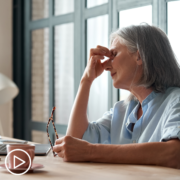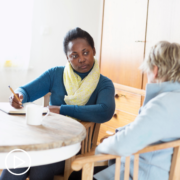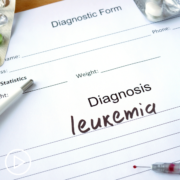PODCAST: CAR T-Cell Therapy Care Partners | Understanding Your Role in Patient Care and Recovery
Understanding CAR T-cell therapy and recovery is vital for care partners who are caring for a loved one undergoing this treatment approach. Dr. Shambavi Richard explains the CAR T-cell therapy process, potential complications, ongoing research in the field, and discusses how care partners can provide support at each stage of the process.
Dr. Shambavi Richard is the Co-Lead Physician for the Multiple Myeloma CAR-T Program at Mount Sinai Tisch Cancer Center. Learn more about Dr. Shambavi Richard.
See More from The Care Partner Toolkit: CAR T-Cell Therapy
Transcript:
Katherine:
Today we’re going to learn about CAR T-cell therapy to help care partners understand how it works, what happens during recovery, and why care partners are so essential throughout the process. Before we meet our guest, let’s review a few important details. The reminder email you received about this program contains a link to a program resource guide. If you haven’t already, click that link to access information to follow along during the webinar. At the end of this program, you’ll receive a link to a program survey. This will allow you to provide feedback about your experience today. And it will help us plan future webinars. Finally, before we get into the discussion, please remember that this program is not a substitute for seeking medical advice. Please refer to your healthcare team about what might be best for you. Well, let’s meet our guest today.
Joining us is Dr. Shambavi Richard. Dr. Richard, welcome. Will you please introduce yourself?
Dr. Richard:
Hi. I’m Shambavi Richard. I am in the myeloma faculty at Mount Sinai. I’m Associate Professor of Medicine. And I codirect the CAR T and cellular therapies for myeloma at my institution.
Katherine:
Well, thank you so much for joining us today. We really appreciate you taking the time.
Dr. Richard:
Thanks for having me.
Katherine:
Let’s begin with the basics of CAR T-cell therapy. What is it? And maybe, actually, we could start with what CAR is short for.
Dr. Richard:
So, CAR stands for chimeric antigen receptors, so CAR T cell is a chimeric antigen receptor T-cell therapy. What that means is T cells, which is one of the cells for immune system are actually come from the patient. They’re expanded and activated in a manufacturing facility. And there they undergo genetic modification to form the CAR T cells. And what’s special about the CAR T cells is that they have the capacity to recognize myeloma cells and are efficient killers of the myeloma cells.
Katherine:
Who might this approach be right for? What determines eligibility?
Dr. Richard:
So, interestingly enough, today as we speak, CAR T cells may be eligible for many, many different kinds of – in the phases, many different phases of the myeloma journey. When they were initially tested, as most new therapies are, they were tested on patients who had very advanced myeloma, really were not candidates or did not have great options for any other kinds of therapy. And when they got tested in these groups of patients, they really had stellar results that far outstripped anything else that we had as options for patients in those advanced stages of myeloma. So, the approval for CAR T cells as they stand today for myeloma is for advance myeloma with patients who have had four or more lines of therapy and have had exposure to pretty much the major three classes of therapies for myeloma which includes proteasome inhibitors, imides, and anti-CD38 antibody therapy.
But having said that, now CAR T cells are being moved into earlier lines of therapy are now being tested in these in various clinical trials. And even for newly diagnosed myeloma patients to see if they are as good as autologous transplants. Are they better than autologous transplants? And so on and so forth. So, really that’s what I mean by saying for now CAR T cells are appropriate for anyone if they are candidates for clinical trials. But in terms of approved indications for CAR T therapy, those are for advanced myeloma patients who have had at least four lines of therapy.
Katherine:
Dr. Richard, what are the potential side effects or complications of CAR T-cell therapy?
Dr. Richard:
So, there are several possible side effects with CAR T therapy.
It’s a little different from an autologous transplants. And I bring that up just to say because they are both cellular therapies, so are frequently compared and contrasted with autologous transplants which we have had for about three decades now. So, the main side effect after CAR T therapy is something called CRS or cytokine release syndrome. So, that happens when CAR T cells recognize the myeloma cells and kill them. A host of chemicals called cytokines are released in the body. And this can make a person feel like they have a bad case of the flu. So, it may be things like fevers, chills, body pains, headaches, loss of appetite, nausea, fatigue. So, these are some common symptoms of cytokine release syndrome. But these are the milder forms, so in more severe cases of cytokine release syndrome, you can have things like drop in blood pressure, drop in oxygen levels, needing supplementation with oxygen.
Or in terms of drop in pressure, they may need fluid resuscitation or sometimes even pressors, blood pressure medications that help to boost the blood pressure. So, that’s one major side effect. Another is something called neurotoxicity.
So, you can have neurological side effects from CAR T therapy which when it occurs in the setting of CRS, that’s called ICANS or immune effector cell-associated neurotoxicity syndrome. That’s what that acronym stands for. And it has a constellation of symptoms such as confusion, disorientation, difficulty with some common everyday tasks. The handwriting may go off, attention deficit, things like that. But then in more severe forms of ICANS, you can actually have lethargy, coma, seizures, brain edema, so much more scary things.
Then there is another form of toxicity called delayed neurotoxicity which looks completely different. Now you have things like Parkinson’s disease or neuropathies. Either cranial nerve neuropathies or peripheral neuropathies, Guillain-Barre which is a kind of ascending paralysis. So, all of these are also possible as neurotoxic side effects from CAR T therapy. Aside from these, there is another which is called HLH or macrophage activation syndrome or hemophagocytic lymphohistiocytosis syndrome wherein patients can have organ toxicity, a spiking ferritin levels, new fevers, new neurotoxic symptoms, additional lab abnormalities such as liver function test abnormalities. So, these are other forms of just general CAR T-cell toxicity.
Then in addition to these, you can have infections, prolonged blood count abnormalities, cytopenia as we call it which can affect the white cells or the platelets or anemia and things like that. So, these are also possible. And then finally things like second primary malignancies which can happen, other malignancies that can happen that may be related to CAR T therapy. A lot of these are still being studied. We don’t have a good understanding of how frequently this happens. But these are all possible side effects of CAR T therapy.
Katherine:
Do any of the complications have to result in hospitalization? Or can patients be treated outside the hospital?
Dr. Richard:
So, the way things stand now, and this may be slightly different depending on the specific CAR T product.
But we generally keep patients hospitalized for the first two weeks after the cell infusion. Most of the side effects such as the CRS and the ICANS tends to occur during this hospitalization phase. HLH and delayed neurotoxicities can occur while they’re still in the later phases of the hospitalization, or it can occur late after they get discharged from the hospital. Infections and cytopenias of course can happen for a while following CAR T therapy. Once they are discharged from the hospital, we ask that they stay close to us, usually within an hour or two of the hospital so that they can quickly come back in if there’s any issues. We see them quite frequently once they get discharged from the hospital. I see them at a minimum of once a week, more frequently at least a couple times a week, or even three times a week depending on what their blood count needs and monitoring needs are.
So, we have them stay close to the hospital if they are far away. And the sponsor and our social worker, insurance can work together to figure out how to help them with the hotel costs if they have to stay close to us. So, that’s for an additional two weeks after they’ve discharged from the hospital. Following that, patients go back to their homes, but we still follow them quite frequently depending on what their needs are in terms of possible side effects.
Katherine:
Dr. Richard, how is CAR T-cell therapy impacting the landscape of myeloma care?
Dr. Richard:
So, as I’d hinted or alluded to previously, prior to CAR T cells appearing on the horizon, we had very limited options for patients who had had the first several lines of therapy.
So, once they had been exposed to two proteasome inhibitors, two iMiDs, and then anti-CD38 antibody which is the three major class of myeloma drugs, they are then called triple class exposed or penta-exposed depending on how many of these drugs they’ve been exposed to.
We had a study called the MAMMOTH study back – this was published back in 2019 prior to the era of CAR T cells and other T-cell directed therapies. And at the time they had looked at patients who were triple class exposed, and who had been exposed to daratumumab were refractory to daratumumab as their last line of therapy. And what we saw was with their next line of therapy or whatever else was available at the time for patients such as these, their expected response rate was only about 30 percent or so, number one.
Two, their outlook was very poor with a median progression-free survival which means that the amount of time that patients could go without the disease coming back, and that median progression-free survival was less than six months. And their expected even median overall survival was well under a year. So, that was what the landscape looked like when CAR T cells came onto the scene. For instance, the CART2 trials, which is one of the approved products which is cilta-cel which is what we have now, we actually saw for this same group of patients, the response rates was now 98 percent.
Deep responses were 83 percent. And we now have the final readout of their median progression-free survival which is almost three years. So, you can see a significant difference.
Under six months, media progression-free survival to three years. And over 50 percent of the patients were living over three years. So, that’s kind of where we are at. I mean so it was no small improvement. This considerably kind of almost reset the bar and has given a new lease of hope and life to patients who had advance myeloma. And one of the things we say in myeloma is although we don’t, as yet, say that myeloma’s curable, we are working towards that. But we are also giving options for other treatments, other research to be effective in patients just by keeping them around longer.
Katherine:
Have there been any recent research developments involving CAR T-cell therapy that patients should know about?
Dr. Richard:
Absolutely. So, much as I have highlighted all the hope and the optimism and the good things about this, the fact is we’re still not curing people with these therapies.
So, we called this a plateau in the survival curve which means that if we achieve that plateau, that means the disease is probably not coming back, and we have essentially the definition of cured. But we’re not seeing that. We’re still seeing a downslope in the survival curves of myeloma which means that patients are still relapsing in spite of these excellent therapies. So, there’s a lot of research going on into why are patients still relapsing? Is it because they’re losing the antigen which the CAR T cells are recognizing? Is it because the CAR T cells are no longer effective even though the antigen is still present? Is it because there’s a considerable lag time between the patients being freezed or collected, the cells being collected for the genetic modification in the lab to the time when the patients can actually receive these cells? And that can be anywhere between four to eight weeks.
So, during this time period, patients with advanced myeloma may not remain static with their disease. The disease is progressing. They’re getting worse. They may not be candidates for these kinds of therapies. So, one of the areas of research is how can we speed up this process, this manufacture process? How can we make it much more available? Because they’re limited by the manufacturing facilities, their abilities to have these viral vectors, to be able to transduce these cells and genetically modify. So, can we take them off of those kinds of things? Can we automate this? Can we improve these manufacturing platforms? So, a lot of different things are being tested. And then as I’d also mentioned earlier, right now they’re approved for advance myeloma, but what if we can bring them up earlier? Are patients actually going to get cured by that? Are they going to have a much better progression-free survival with that versus waiting until they’re very advanced? So, these are all many, many things that are being looked at.
In addition, a lot of these CAR T products, these approved products, all them are all recognizing one antigen on the myeloma cell. Now there are products are being looked at that are dual target antigen recognition ability. So, that’s another thing. So, maybe if the CAR T cells are missing one of the antigens, and they’re not able to use that to kill the myeloma cell, maybe the other antigen can pick up the slack. So, these are various things that are being looked at.
Katherine:
Yeah. Well, now that we understand a bit more about what it is, let’s walk through the process.
When a patient goes through CAR T, what happens first?
Dr. Richard:
So, the first step is being referred to a CAR T physician. Right now, CAR T therapies can only be done in certain tertiary care institutions, not even all tertiary care institutions.
They have to have the ability to manage and process cellular therapies. So, that’s limited right there. So, patients have to be referred to centers, so actually do these CAR T kind of therapies. Once they meet with the myeloma physician who deals with CAR Ts as well, then the way it works in our institution is then we assess them for which is the best kind of CAR T product the patient may be eligible for. Are they eligible for clinical trials? Do they fit the profile for clinical trial? Are the patients willing for clinical trails? If not, are they candidates for one of the commercially approved products? As I said, there is specific criteria. Patients have to have had at least four lines of therapy to be able to receive a commercially approved CAR T product.
If that is the case, and once the process has been explained to the patient, they have to go through all the financials, the insurance approval. These are very expensive propositions. So, the insurance goes through all of the criteria to make sure that they will approve the product. Once the insurance approves, they also going through the institutional approval process to make sure that these are again being done for the right patient, and that they go through the institutional approval. There are several patient specific characteristics.
For instance, we want a patient who has the support structure to be able to support a therapy like this. They have to have a good performance status. They have to be relatively able to be able to handle these kinds of therapies. I went through all of those side effects that are possible. We look at their cardiac status. We look at the neurological status.
We look at the pace at which their disease is escalating because these are again advanced patients. So, if somebody is relapsing very quickly, they may not have the time to wait to get to a slot for the apheresis, and then to wait again for the manufacturing to happen. So, we look at all of that. We look at their kidney function. And then finally in terms of their psychosocial, do they have their caretakers, the support system? Where do they live? Are they able to access our center? Are they from out of state? If so, how are we going to manage during those initial months until they’re able, stable enough to be discharged back to their referring physician?
So, we look at several things, so we have multiple teams of people, social work, pharmacy who looks at all of these different – and explains the pharmaceutical aspects of all of this, our finance team, our coordinators who put all of this together. For the apheresis, we are involved with a apheresis team.
And then the cell therapy lab that processes the cells, the vascular team to put in the lines required for the apheresis. So, there are several, several groups. And then if we need to get a consultation from our expert cardiologist or neurooncologist, we need to have those teams involved as well.
Katherine:
How long does it take to know whether the treatment has been successful?
Dr. Richard:
So, we get a sense depending on what their blood markers look like, we can get a sense within the first month if the patient is actually responding to the treatment or not. I generally wait for the first three months to do a actual formal assessment with their bone marrow and their PET scans and everything else because right around then they’ve gone through the initial acute post CAR T period. And so, at the time of the bone marrow we assess what it looks like, we send for a test called MRD which is minimal residual disease to see where they’re at with that.
And PET scans to look at any areas of skeletal lesions or even extramedullary disease that they may have. So, I would say within the first month we get a sense, but by three months we do that first formal assessment.
Katherine:
You mentioned the role of the care partner, and you’ve talked about the recovery process and how involved it is. What do you feel is the care partner’s role in helping a patient through the process?
Dr. Richard:
I think much of it is emotional and psychological support. I think that is very, very key. But in terms of actually what they do, we do ask that they have a caretaker available 24/7 if possible at least for the first month or so following their CAR T. And this is because they need a lot of support going back and forth from wherever they’re residing whether it’s a hotel or whether it’s their own home because there are a lot of clinic visits during that time.
We do ask that the patients don’t drive for at least the first month, maybe even the first couple of months following the CAR T because again they can have neurological side effects that may be somewhat subtle. Their judgement may be impaired, but they may not look that different. So, a caretaker who knows them well is very useful in saying, “There’s something weird about how Joe’s acting lately,” or something like that.
So, that’s very important as well to bring them back and forth and to manage all of these. And if there’s a problem in the middle of the night, if they’re having new fevers, they’re suddenly neurologically altered, they do need a person to be able to handle things and bring them in and get the adequate medical support.
Katherine:
What questions should care partners be asking if they begin the process?
Dr. Richard:
I think a good understanding of all of those.
So, whatever that takes for each individual person. We have patients of various different kinds who have come to us, some who have researched it and really know what’s going on out there, and others who are comparatively, “What is this CAR T thing? We have no idea what this is all about.” So, I meet each one where they are. I go over the entire process. I touch on all the different things that we just spoke about. I talk about the logistics of it. I talk about the timing. One of the traffic jams is being able to get that initial fresis slot to be able to even send the cells to the manufacturing.
So, there’s a question of managing the resources and making sure that patients are getting to their CAR T slots in a timely manner. So, a good part of it is an understanding that all of this is not something that happens overnight. There is several moving parts. There is a way, and their system, and a way that all of these have to be aligned.
So, I pretty much answer whatever they have, but I think questions touching on all of this. And finally, they exact thing that you asked, “How is it that they can help? What are the things that they can do to help?” And I think that is hugely important as well.
Katherine:
Yeah. Why is it so important that care partners let the care team know about any changes in the patient?
Dr. Richard:
I think the earlier we know of changes, the better. We can handle these things. There is a time sensitivity to a lot of this. If issues that happen are not addressed right away, they can evolve to more severe condition. And once if they’re more severe, they’re less likely to respond right away to the therapeutic maneuvers that we have. So, I think that’s really important.
And if they’re outpatient, we do bring them in for hospitalization right away. If there is anything that is – the delayed forms of these side effects can sometimes be also a little bit harder to resolve and turn around. So, it’s important that they come back to the hospital right away, get admitted for the workup, so that we can escalate the speed at which things can be done.
Katherine:
Being a care partner can be overwhelming at times. Do you have any advice to help care partners as they cope with their role?
Dr. Richard:
There’s a lot of support groups. I really encourage them to start talking to a social worker right away. So, our social workers really do get engaged in the process pretty early. There are many different kinds of support groups. There are support groups that are myeloma specific, and then support groups within those that are offshoots for CAR T patients, so people either thinking of going through a CAR T or in the middle of it or even post CAR T.
All the anxiety of the monitoring and, “Is the disease going to come back?” And that can weigh heavily on the caretaker as well. So, an emotionally supported caretaker and patient just makes it a lot easier for everybody including the medical care teams to be able to handle all of this.
Katherine:
We have a few questions that are community sent in prior to the program. I’d like to start with Melissa’s question. “Do you have any advice for handling the emotional highs and lows as well as personality changes within the relationship?”
Dr. Richard:
That can be a challenging one. And as medical doctors, we tend to not be the best people to usually – and so what I really draw on is social work and our coordinator’s support for that kind of thing. At our institution we have a affiliate of care of supportive care oncology team who help with a lot of the symptom management or anything like that.
And if it’s something that actually needs more than just counseling, if they actually need medications, then we have our psychiatric oncology groups who also help with a lot of those. So, I think being prepared for any of these is important, but I think a lot can be handled just by having a good adequate support of care that starts right at the beginning of the process before things start getting overwhelming.
Katherine:
Yeah. Here’s another question we received: What kind of nutrition does a patient need during this process? And how can the care giver ensure adequate nutritional support?
Dr. Richard:
So, among our various teams, we have actually a nutritionist who actually meets with the patient about the time of their discharge from the hospital. And they give them a lot of guidelines about how to handle various dietary things.
In general, going into CAR T, a well-balanced healthy diet is always a good thing. Maintain your diet well as much as possible. Following the CAR T process, we do follow guidelines for what we call a neutropenic diet wherein well-cooked meats are preferable to anything undercooked because that’s where you can have a lot of bacteria. We advise against raw or undercooked meats of all kinds. Pasteurized foods obviously much better than don’t go for the unpasteurized. Don’t go for the soft cheeses which tends to be unpasteurized or typical wherein you can have – and also in terms of nuts, prefer the roasted nuts rather than the raw nuts and things like that. So, any fruits and vegetables, we advise that they should be well washed and cleaned.
We advise against the thin-skinned ones that are harder to clean. We prefer rather the thick-skinned fruits where you can wash it well and then peel it. So, those have less tendency to spread diseases and bacteria and things like that. So, those are some of the things that we advise. And we do give them a dietary sheet wherein they have the dos and don’ts, but because it’s easy to forget some of these. We prefer don’t go to delis. Don’t get deli meat. So, if you like those kinds of things, get the packaged form where you can control the quality of things like that.
Katherine:
What about something like raw fish? Is that recommended or not?
Dr. Richard:
We prefer it not. Raw fish again like smoked fish and things like that, we prefer to avoid those things at least for the first few months after CAR T. We generally make these somewhat straight for the first three months.
Post CAR T patients are immunosuppressed for a long time. There’s no great science at the three-month mark because I think at three months plus one day you’re probably still at some risk. And everybody’s immune recovery is different. So, patients who are immunosuppressed for a long time, I say, “Just try to stick to these unless it’s something that you really can’t do without.” But it’s much better to try to maintain these guidelines for as long as possible.
Katherine:
Another audience member wants to know, “What is the difference between CAR T and bispecific antibody treatment?”
Dr. Richard:
Oh, good one. So, as I mentioned, with the CAR Ts, the T cells that are taken from the patient is actually genetically modified. So, these are kind of souped-up T cells if you want to put it that way because one, they efficiently recognize that myeloma cells, and two, they are efficient killers of the myeloma cells which are the two main jobs of your T cells.
With a bispecific antibody, this is an off the shelf thing, so this is not manufactured specifically for the patient. And then it’s a drug. And the drug has two receptors. One recognizes the myeloma cell, and the other recognizes the patient’s own T cells. So, these are unmodified T cells that just floating around. And they bring the patient’s T cells to the myeloma cell to kill it. So, that’s the difference. It’s an off the shelf product versus a manufactured. The T cells are your own. They are not manufactured in any way, but otherwise they’re kind of similar in that they’re both T-cell directed killing mechanisms, and they recognize the myeloma cell.
Katherine:
Okay. Thank you for that. Thoughtful answers, Dr. Richard. We appreicate it. Before we end the program, I’d like to get your final thoughts. What message would you like to leave the audience with?
Dr. Richard:
I want to leave a message of hope. I want to leave a message that there is so much research going on.
And we couldn’t do any of these without the involvement of patients and their caregivers. And that’s how we have moved the field forward to this extent. And that’s how we continue to move the field forward. There’s a lot of reason to hope. And the Holy Grail, of course, is cure. And that’s what the entire myeloma community is working toward getting to that goal one day. So, I want to thank the patients and the caregivers for helping to move this, so helping themselves and helping others.
Katherine:
Well, Dr. Richard, thank you so much for taking the time to join us today.
Dr. Richard:
Thank you for having me.
Katherine:
And thank you to all of our partners.
If you’d like to watch this webinar again, there will be a replay available soon. You’ll receive an email when it’s ready. And don’t forget to take the survey immediately following this webinar. It will help us as we plan programs in the future. To access tools to help you become a proactive care partner, visit powerfulpatients.org.
I’m Katherine Banwell. Thanks for being with us.



























